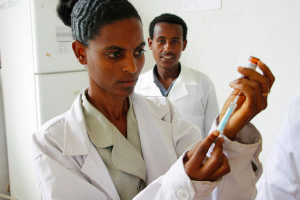
A health care worker prepares a measles vaccine in Ethiopia. Photo credit: Pete Lewis /DFID.
At a health center in the Ethiopian capital, Addis Ababa, a mother carries her child while waiting in line for him to receive a meningitis vaccine. “I have heard from the media about meningitis that it can physically disable or kill a child,” says the mother, Seble Yihun. Previously, she might have waited for a health extension worker to come to her home with the vaccine. But, she said, “I also heard health care centers are getting short of vaccines. That is why I rushed my son to the center instead of waiting for the health extension worker to come to my home."
Ethiopian journalists produced dozens of stories about the effectiveness of vaccines in response to an international story contest organized by the International Center for Journalists in collaboration with the African Health Journalists Association and the Arab Media Forum. The coverage sparked by the contest had impressive results.
Health extension worker Frehiowt Takele says that an increase in media reports on vaccination is leading to an uptick in the number of parents bringing their children to health centers for vaccination. “Often, parents take time to accept and practice what we teach them about child health. But now, when I go door to door to announce meningitis and measles vaccination campaign, mothers are already informed. I think this is because of media reports on vaccination,” Frehiwot said.
This is exactly what my recent journalism workshops on vaccine coverage aimed to do: prepare journalists to write evidence-based vaccine stories to help parents understand that childhood immunization guarantees protection from deadly diseases.
More than 50 health journalists who have attended the workshops work very hard to ensure quality vaccines related messages that can be easily understood by the parents and caregivers are on air and published. Radio and television shows, newspapers and social media created a platform to discuss unfounded traditional beliefs with regard to preventing childhood diseases. The wide coverage of vaccine stories help health service providers to notice gaps in addressing public demand.
Metasebia Kassaye, a health journalist from Addis Admas weekly newspaper wrote several vaccine stories after she attended journalists training workshop in Addis Ababa. Metasebia argues that high demand for vaccination is observed during the campaigns because the media extensively reported on immunization and the marking of World Vaccination Week that generated public acceptance and demand for vaccination service. Metasebia’s assertion made me to believe that the media has successfully played its role of mobilizing the public for vaccination.
Journalists did not stop their vaccine coverage when they observed that most health centers were crowded by parents demanding for their infants to be vaccinated against meningitis and measles. As the number of people who came for the service increased unexpectedly, extraordinary stories started to emerge - some health centers ran out of stock before the campaign ended. In view of this, health journalists began to pitch stories about quality immunization service.